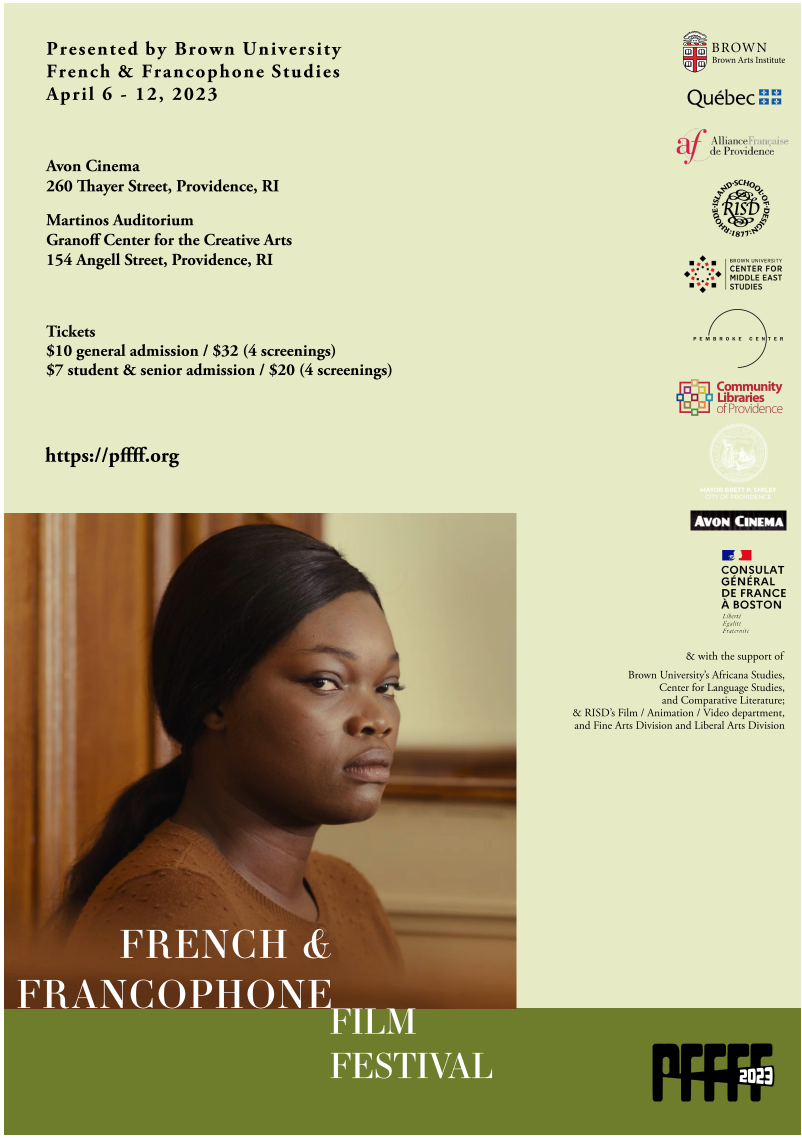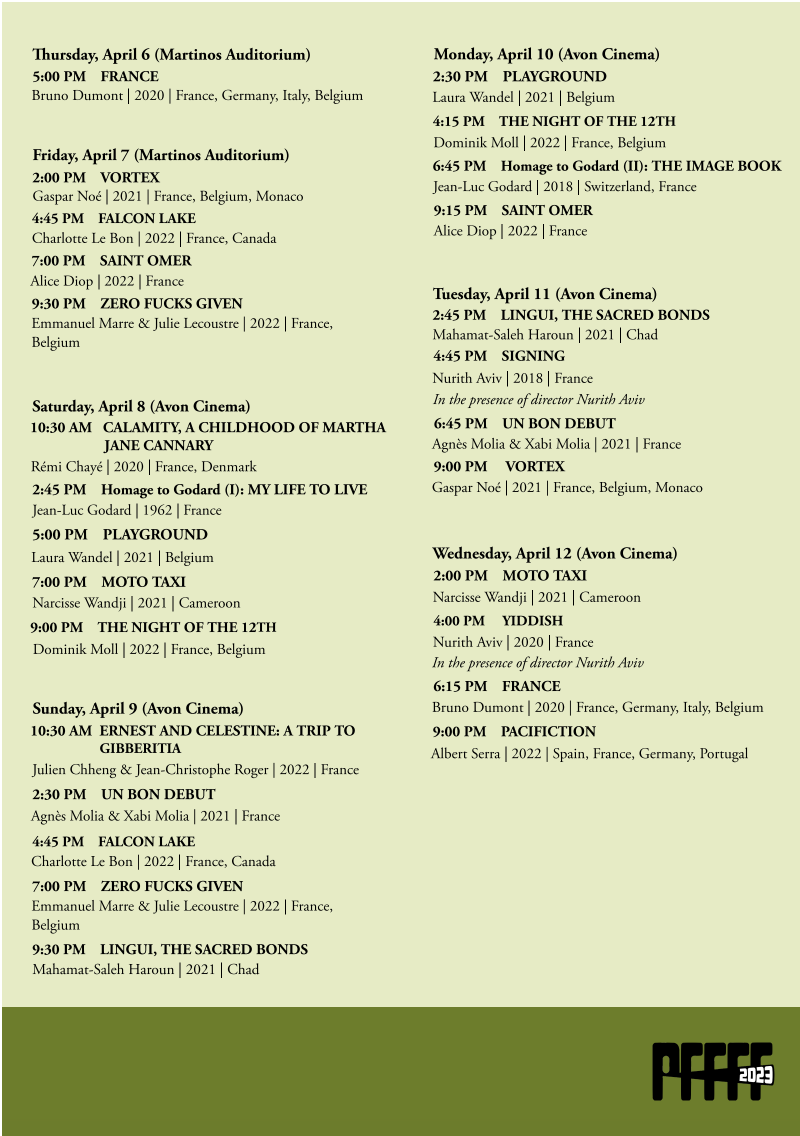ABOUT
Presented by the Department of French & Francophone Studies (Brown University) at Martinos Auditorium in the Granoff Center for the Arts and at Avon Cinema.
The Providence French Festival, henceforth renamed the Providence French and Francophone Film Festival (PFFFF), started in 1995. Organized by the
Department of French and Francophone Studies at Brown University, it is an event open to the city of Providence and the greater community of Rhode Island. The festival’s 2023 edition will take place on April 6-12, kicking off at the Martinos Auditorium at Brown’s Granoff Center for the Arts, and continuing at the Avon, a vintage independent cinema right off campus, owned by the same family since 1938.
France, Cameroon, Belgium, Canada, Chad, and Switzerland will be represented through a selection of more than fifteen films from 2021 and 2022. The repertoire includes feature films by such directors as Alice Diop, Bruno Dumont, Mahamat-Saleh Haroun, Charlotte Le Bon, Albert Serra, Gaspard Noé and Laura Wandel. Two special sessions will be devoted to a younger audience over the weekend (Ernest et Célestine and Calamity).
This year’s program foregrounds certain themes, one of which is womanhood. Some films deal with violence exacted against women, from feminicide (La Nuit du 12) to rape (Moto Taxi) to the denial of abortion rights. They explore no less the strength of resistance, and the repairing of bonds, both subtle and sacred, that restore the power of an age-old sorority (Saint Omer and Lingui). Filmmakers also turn their lens on the world of school and its challenges (Un monde and Un bon début), on the fragility of aging (Vortex) and adolescence (Falcon Lake), on the precarity of work and the
disaffection it can breed (Rien à foutre). Two films, respectively opening and closing the festival (France and Pacifiction), offer a critical—ironic, almost fantastic—take on what “France” means.
In addition, the festival will include special features highlighting the works of two auteur.e.s. First, a tribute to the great Jean-Luc Godard (deceased in 2022), with the screening of one of his early films (Vivre sa vie, 1962) and his last (Le Livre d’image, 2018). Then, a special invitation to the filmmaker Nurith Aviv, witness to an extraordinary period in the history of French cinema, and creator of an œuvre concerned with questions of translation and the plurality of languages: she will introduce in person her films Signer (2018), on sign language, and Yiddish (2021).
*
Le Providence French Film Festival (rebaptisé désormais Providence French and Francophone Film Festival, PFFFF) existe depuis 1995. Organisé par le département d’études françaises et francophones de l’université de Brown, il se veut ouvert à la ville de Providence et à l’ensemble de la communauté du Rhode Island. L’édition 2023 se déroulera du 6 au 12 avril et aura lieu à la fois dans un auditorium de l’université (Martinos Auditorium, Granoff Center for the Arts) et dans un vieux cinéma indépendant de quartier (Avon Cinema, fondé en 1938).
La France, le Cameroun, la Belgique, le Canada, le Tchad et la Suisse seront représentés à travers plus d’une quinzaine de films choisis dans les productions récentes : des réalisatrices et réalisateurs comme Alice Diop, Bruno Dumont, Mahamat-Saleh Haroun, Charlotte Le Bon, Albert Serra, Gaspard Noé ou Laura Wandel seront à l’affiche avec des long-métrages sortis en salle entre 2021 et 2022. Un moment spécial sera aussi consacré aux
plus petit·e·s durant le week-end (Ernest et Célestine and Calamity).
Parmi les thèmes qui se dégagent de notre sélection, il y a d’abord la féminité. Nombre de films évoquent les violences faites aux femmes, depuis le féminicide (La Nuit du 12) ou le viol (Moto Taxi) jusqu’au déni du droit à l’avortement. Ils montrent aussi les forces de résistance, les liens qui se renouent, à la fois subtils et sacrés, pour relancer la puissance d’une sororité ancienne (Saint Omer et Lingui). Les cinéastes posent également leur regard sur l’univers scolaire et ses défis (Un monde et Un bon début), sur les fragilités de la vieillesse (Vortex) ou de l’adolescence (Falcon Lake), sur la précarité du travail et la démobilisation qu’elle peut entraîner (Rien à foutre). Deux films, enfin, respectivement en ouverture et en clôture du festival (France et Pacifiction), proposent une vision critique — ironique ou presque fantastique — de ce que « France » veut dire.
Deux moments monographiques viennent ponctuer notre programmation. D’une part, un hommage au grand Jean-Luc Godard (disparu en 2022), avec la
projection de l’un de ses premiers films (Vivre sa vie, 1962) et de son dernier (Le Livre d’image, 2018). D’autre part, l’invitation faite à la cinéaste Nurith Aviv, témoin de la grande époque de l’histoire du cinéma français et auteure d’une œuvre où se dégagent notamment les questions de traduction et de multiplicité des langues : elle présentera elle-même Signer (2018), consacré à la langue des signes, et Yiddish (2021).
Presented by the Department of French & Francophone Studies (Brown University) at Martinos Auditorium in the Granoff Center for the Arts and at Avon Cinema.
The Providence French Festival, henceforth renamed the Providence French and Francophone Film Festival (PFFFF), started in 1995. Organized by the
Department of French and Francophone Studies at Brown University, it is an event open to the city of Providence and the greater community of Rhode Island. The festival’s 2023 edition will take place on April 6-12, kicking off at the Martinos Auditorium at Brown’s Granoff Center for the Arts, and continuing at the Avon, a vintage independent cinema right off campus, owned by the same family since 1938.
France, Cameroon, Belgium, Canada, Chad, and Switzerland will be represented through a selection of more than fifteen films from 2021 and 2022. The repertoire includes feature films by such directors as Alice Diop, Bruno Dumont, Mahamat-Saleh Haroun, Charlotte Le Bon, Albert Serra, Gaspard Noé and Laura Wandel. Two special sessions will be devoted to a younger audience over the weekend (Ernest et Célestine and Calamity).
This year’s program foregrounds certain themes, one of which is womanhood. Some films deal with violence exacted against women, from feminicide (La Nuit du 12) to rape (Moto Taxi) to the denial of abortion rights. They explore no less the strength of resistance, and the repairing of bonds, both subtle and sacred, that restore the power of an age-old sorority (Saint Omer and Lingui). Filmmakers also turn their lens on the world of school and its challenges (Un monde and Un bon début), on the fragility of aging (Vortex) and adolescence (Falcon Lake), on the precarity of work and the
disaffection it can breed (Rien à foutre). Two films, respectively opening and closing the festival (France and Pacifiction), offer a critical—ironic, almost fantastic—take on what “France” means.
In addition, the festival will include special features highlighting the works of two auteur.e.s. First, a tribute to the great Jean-Luc Godard (deceased in 2022), with the screening of one of his early films (Vivre sa vie, 1962) and his last (Le Livre d’image, 2018). Then, a special invitation to the filmmaker Nurith Aviv, witness to an extraordinary period in the history of French cinema, and creator of an œuvre concerned with questions of translation and the plurality of languages: she will introduce in person her films Signer (2018), on sign language, and Yiddish (2021).
*
Le Providence French Film Festival (rebaptisé désormais Providence French and Francophone Film Festival, PFFFF) existe depuis 1995. Organisé par le département d’études françaises et francophones de l’université de Brown, il se veut ouvert à la ville de Providence et à l’ensemble de la communauté du Rhode Island. L’édition 2023 se déroulera du 6 au 12 avril et aura lieu à la fois dans un auditorium de l’université (Martinos Auditorium, Granoff Center for the Arts) et dans un vieux cinéma indépendant de quartier (Avon Cinema, fondé en 1938).
La France, le Cameroun, la Belgique, le Canada, le Tchad et la Suisse seront représentés à travers plus d’une quinzaine de films choisis dans les productions récentes : des réalisatrices et réalisateurs comme Alice Diop, Bruno Dumont, Mahamat-Saleh Haroun, Charlotte Le Bon, Albert Serra, Gaspard Noé ou Laura Wandel seront à l’affiche avec des long-métrages sortis en salle entre 2021 et 2022. Un moment spécial sera aussi consacré aux
plus petit·e·s durant le week-end (Ernest et Célestine and Calamity).
Parmi les thèmes qui se dégagent de notre sélection, il y a d’abord la féminité. Nombre de films évoquent les violences faites aux femmes, depuis le féminicide (La Nuit du 12) ou le viol (Moto Taxi) jusqu’au déni du droit à l’avortement. Ils montrent aussi les forces de résistance, les liens qui se renouent, à la fois subtils et sacrés, pour relancer la puissance d’une sororité ancienne (Saint Omer et Lingui). Les cinéastes posent également leur regard sur l’univers scolaire et ses défis (Un monde et Un bon début), sur les fragilités de la vieillesse (Vortex) ou de l’adolescence (Falcon Lake), sur la précarité du travail et la démobilisation qu’elle peut entraîner (Rien à foutre). Deux films, enfin, respectivement en ouverture et en clôture du festival (France et Pacifiction), proposent une vision critique — ironique ou presque fantastique — de ce que « France » veut dire.
Deux moments monographiques viennent ponctuer notre programmation. D’une part, un hommage au grand Jean-Luc Godard (disparu en 2022), avec la
projection de l’un de ses premiers films (Vivre sa vie, 1962) et de son dernier (Le Livre d’image, 2018). D’autre part, l’invitation faite à la cinéaste Nurith Aviv, témoin de la grande époque de l’histoire du cinéma français et auteure d’une œuvre où se dégagent notamment les questions de traduction et de multiplicité des langues : elle présentera elle-même Signer (2018), consacré à la langue des signes, et Yiddish (2021).



